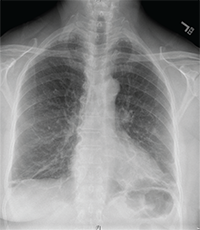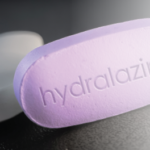
Image Credit: BKD1/shutterstock.com
“Worst of all is the pain in my calves,” she said. “It feels like burning deep inside.” So began my first encounter with a 69-year-old woman who was referred to rheumatology clinic for evaluation of two months of constitutional symptoms and a positive ANCA test, which had been ordered by her primary care doctor. Her symptoms began in December, with fever, chills, non-productive cough and hoarseness.
She was treated with guaifenesin for a presumed viral upper respiratory infection, but two weeks passed, and the patient felt no better. Her fevers persisted, and she developed myalgias, fatigue and pain in the hands, knees and ankles without joint swelling or redness. She had no sinus symptoms, sore throat, cough, ear pain, headache, dysuria, recent travel or sick contacts. She saw her primary care doctor, who noted trace bilateral calf edema and tenderness in the MCPs, PIPs and ankles without joint fullness.
For workup of persistent fevers, fatigue and myalgia, her primary care physician checked labs, which revealed mild leukocytosis (WBC 13.1) with a normal differential, mild anemia (HCT 34.2), thrombocytosis (Plt 458), normal creatinine (0.85) and a normal liver panel (ALT 19, AST 25, AlkP 150, T.bili 0.4, albumin 3.8) with the exception of elevated globulin (4.9). Acute-phase reactants were markedly elevated, with ESR 94 and CRP 107. Hepatitis C antibody and Lyme ELISA were negative, and TSH was low (0.3). These results prompted further bloodwork, which revealed normal ferritin (136), normal free T4 (1.1), moderately elevated rheumatoid factor (36), negative anti-CCP, positive pANCA (MPO and PR3 not checked) and positive IgG, but IgM was negative for parvovirus, EBV and CMV. The patient was referred to rheumatology for evaluation of possible ANCA vasculitis.
Rheumatology Presentation
Prior to her appointment, I considered how to approach the positive pANCA in the setting of constitutional symptoms, elevated ESR and CRP, mild anemia and normal creatinine. Her records did not mention pulmonary symptoms, aside from cough. She did not appear to complain of neurologic symptoms or urinary changes and had denied sinus symptoms. There was no mention of illicit drug use, unusual medications or rash. The constitutional symptoms and elevated inflammatory markers seemed a loose indication for checking ANCA, so I took the positive result with a grain of salt. This was a patient for whom a thorough history and exam would be essential.

Image 1: The chest X-ray was remarkable for apical scarring, basilar atelectasis and/or scarring, bronchiectasis in the lingula and absence of lymphadenopathy.

